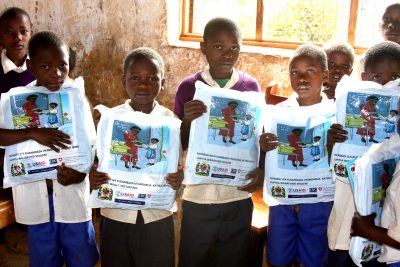“We want to implement programs at the grassroots level for the sustainability of health activities.”

Students hold their new bed nets at Tanga Primary School, where 325 nets were distributed. Photo source: Hayley Gibson
Under the leadership of the U.S. Agency for International Development (USAID) and the Centers for Disease Control and Prevention, the President’s Malaria Initiative (PMI) has worked with Tanzania’s National Malaria Control Program to implement a grassroots approach to educating Tanzanians at the village level about the necessity of using bed nets to prevent malaria. Over the past decade, PMI/USAID involvement in increasing ownership and use of insecticide-treated bed nets has been a major factor contributing to a reduction in malaria prevalence of over 45 percent between 2007 and 2011.
August 2014 marked the second round of the School Net Program, in which USAID distributed over 500,000 insecticide-treated bed nets in three regions in the south of Tanzania: Ruvuma, Lindi and Mtwara. Annually, the program distributes the nets to children in Tanzania’s southern regions with the intent that every household member will eventually own a net. All 3,200 primary and secondary public schools in the three southern regions participated in the program, significantly improving protection for the most vulnerable: pregnant mothers and children.
At the grassroots level, USAID partnered with Johns Hopkins University to collaborate with community-based organizations to ensure that every person who had a bed net actually used it. The organizations operate through health clinics and social services, and typically place two volunteers in each village to educate local residents on malaria, HIV and family planning.
The community-based platform presented an unprecedented opportunity to prepare for the bed net distribution through schools. “This year, we went down further, to the village level, where we had two volunteers to lead orientation on the School Net Program,” said Assely Mwumaka, who is the coordinator for Johns Hopkins University.
Johns Hopkins also created a program that airs on the radio regularly to lead discussions on various topics related to malaria and family health. Through this local approach, villages have a greater understanding of malaria, and were prepared for the School Net Program in August.
This approach has created a sustainable partnership between health and education. “We want to implement programs at the grassroots level for the sustainability of health activities,” said Mwumaka.
This story was taken from www.usaid.gov.
